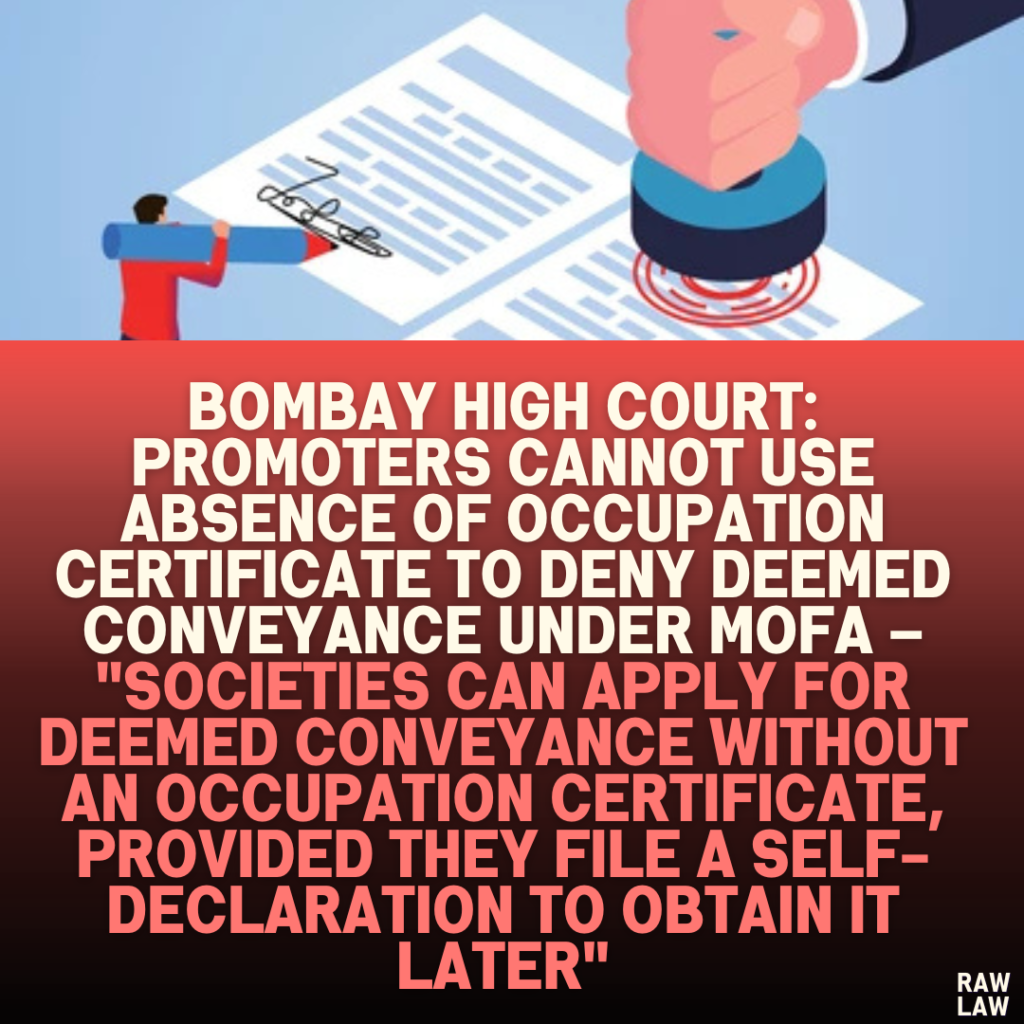Court’s Decision
The Bombay High Court overturned the Competent Authority’s decision that denied a deemed conveyance certificate to a cooperative housing society under the Maharashtra Ownership of Flats Act (MOFA). The court held that:
- The absence of an occupation certificate, a statutory obligation of the promoter, does not bar the issuance of deemed conveyance.
- The Competent Authority is directed to issue the certificate for deemed conveyance, enabling the society to acquire ownership rights and proceed with redevelopment or regularization.
Facts
- Land Ownership and Development:
- The land in question was owned by the legal heirs of a deceased individual and was later transferred to a developer for residential construction.
- Agreements for sale were executed under MOFA, and flats were sold to various purchasers.
- Formation of Society:
- A cooperative housing society was registered in 2004 for the flat purchasers.
- The building was fully constructed but lacked an occupation certificate, and certain floors were declared unauthorized by the planning authorities.
- Application for Deemed Conveyance:
- In 2015, the society applied for a deemed conveyance certificate under Section 11 of MOFA.
- The application was rejected by the Competent Authority in 2017, citing:
- Missing sale agreements.
- Absence of an occupation certificate.
- Illegality in the construction of certain floors.
Issues
- Can the absence of an occupation certificate bar a cooperative housing society from obtaining a deemed conveyance under MOFA?
- Does illegality in the building’s construction justify rejecting a deemed conveyance application?
- Can the Competent Authority reject an application without giving the society an opportunity to rectify alleged defects?
Petitioner’s Arguments
- Occupation Certificate Not Mandatory for Deemed Conveyance:
- The obligation to obtain an occupation certificate lies with the promoter, not the society.
- The phrase “if any” in Section 11(3) of MOFA indicates that a deemed conveyance application can proceed even without an occupation certificate.
- Purpose of Deemed Conveyance:
- Without a deemed conveyance, the society cannot regularize the structure or proceed with redevelopment.
- The flat purchasers, having paid for their homes, are trapped in a “vicious cycle” due to the promoter’s defaults.
- Application Completeness:
- The Competent Authority issued notices to opponents, implying the application was complete. The rejection for alleged defects (missing sale agreements) was, therefore, unsustainable.
- Government Resolution of 2018:
- The Government of Maharashtra allowed societies to file a self-declaration and apply for occupation certificates post-deemed conveyance. This should apply retroactively to the society’s application.
Respondent’s Arguments
- Defective Application:
- The application was incomplete as it lacked key documents like the sale agreements and the full commencement certificate.
- The attached Permanent Alternate Accommodation Agreement (PAAA) did not meet the requirements of a MOFA agreement.
- Illegality of Construction:
- The construction was unauthorized as the commencement certificate was limited to the plinth area.
- No deemed conveyance can be granted for an illegal structure.
- No Automatic Rights:
- Granting a deemed conveyance certificate would amount to legitimizing unauthorized construction, which is impermissible.
Analysis of the Law
- Section 11 of MOFA:
- Sub-section (3): Requires an application for deemed conveyance to include “all relevant documents, including the occupation certificate, if any.”
- The phrase “if any” indicates that an occupation certificate is not mandatory for deemed conveyance.
- The Competent Authority must assess the promoter’s statutory obligations and not penalize the society for the promoter’s failures.
- Obligations of the Promoter:
- MOFA imposes a duty on the promoter to convey title to the society and secure all necessary approvals, including the occupation certificate.
- Failure to comply with these obligations does not affect the society’s right to enforce deemed conveyance.
- Government Resolution of 2018:
- Clarifies that societies can apply for deemed conveyance without an occupation certificate, provided they file a self-declaration to obtain the certificate later.
Precedent Analysis
- Samruddhi Co-op Housing Society v. Mumbai Mahalaxmi Construction Pvt. Ltd.:
- The Supreme Court emphasized that promoters are obligated to secure occupation certificates under MOFA and cannot avoid their statutory duties.
- Sukhsagar Co-op Housing Society Ltd v. State of Maharashtra:
- The Bombay High Court held that promoter defaults cannot bar cooperative housing societies from enforcing their statutory rights.
- Other Observations:
- Courts have consistently held that deemed conveyance does not legalize unauthorized structures; it merely transfers ownership rights to the society.
Court’s Reasoning
- Promoter’s Defaults:
- The promoter’s failure to obtain an occupation certificate or comply with planning laws cannot be used as a defense to deny the society’s rights.
- The society and flat purchasers cannot be disadvantaged due to the promoter’s non-compliance.
- Effect of Deemed Conveyance:
- A deemed conveyance certificate does not legitimize unauthorized construction. It only transfers the promoter’s ownership rights to the society, enabling them to proceed with legal remedies like regularization or redevelopment.
- Administrative Lapse:
- The Competent Authority failed to issue a notice to the society to rectify alleged defects in the application. This procedural irregularity made the rejection unsustainable.
Conclusion
- The court quashed the Competent Authority’s rejection of the deemed conveyance application.
- It directed the Competent Authority to issue the deemed conveyance certificate, subject to the society filing a self-declaration and addressing redevelopment needs.
Implications
- For Societies:
- Societies can seek deemed conveyance without occupation certificates, ensuring their ability to regularize or redevelop properties.
- For Promoters:
- Promoters are reminded of their statutory obligations under MOFA and cannot use their non-compliance to avoid granting rights to societies.
- Municipal Corporations:
- The decision reaffirms that deemed conveyance does not interfere with municipal authorities’ powers to address unauthorized constructions.
- Policy Clarity:
- The judgment highlights the importance of clear administrative processes for deemed conveyance, reducing procedural hurdles for societies.




Pingback: Bombay High Court Upholds Validity of SEBI Regulation Allowing Delisting Under IBC Resolution Plans: "IBC Provisions Override Delisting Regulations to Facilitate Insolvency Resolutions" - Raw Law